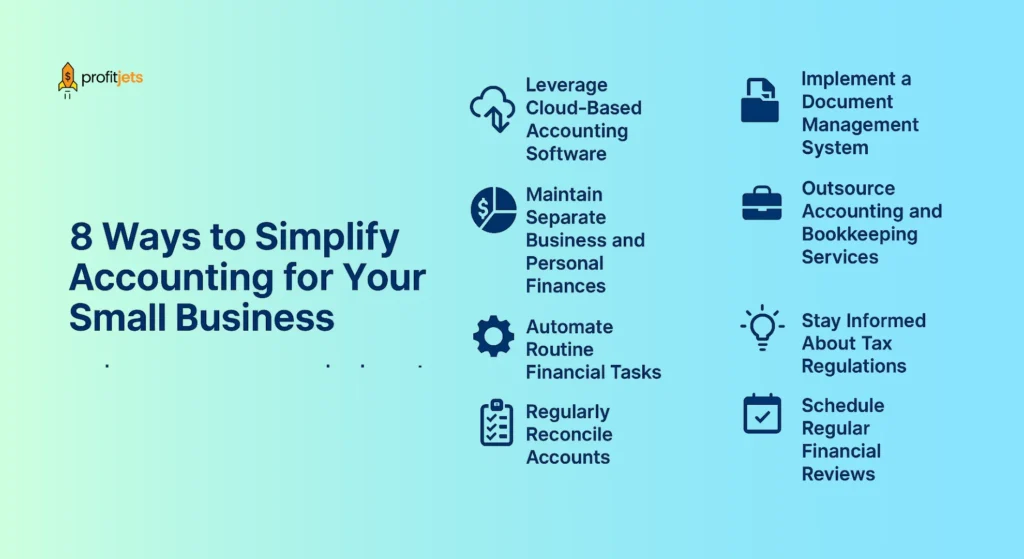In 2025, managing finances efficiently is crucial for small businesses, startups, freelancers, and e-commerce entrepreneurs. Simplifying accounting processes not only saves time but also ensures compliance and informed decision-making. This guide outlines eight practical ways to make accounting more manageable, highlighting the benefits of outsourced accounting and bookkeeping services.
Table of Contents

1. Leverage Cloud-Based Accounting Software
Transitioning to cloud-based accounting platforms like QuickBooks Online, Xero, or FreshBooks offers real-time access to financial data, automated backups, and seamless integration with other business tools. These platforms simplify tasks such as invoicing, expense tracking, and financial reporting, making accounting more efficient.
2. Maintain Separate Business and Personal Finances
Keeping business and personal finances separate is fundamental. Establish dedicated business bank accounts and credit cards to streamline expense tracking, simplify tax preparation, and present a clear financial picture to stakeholders.QuickBooks
3. Automate Routine Financial Tasks
Automating tasks like invoice generation, payment reminders, and recurring billing reduces manual errors and saves time. Automation ensures consistency and allows you to focus on strategic aspects of your business.
4. Regularly Reconcile Accounts
Consistent reconciliation of bank statements, credit card transactions, and accounts receivable/payable helps identify discrepancies early, maintain accurate records, and prevent potential financial issues.
5. Implement a Document Management System
Organizing financial documents digitally using cloud storage solutions like Google Drive or Dropbox ensures easy access, enhances security, and facilitates efficient record-keeping, especially during audits or tax season.
6. Outsource Accounting and Bookkeeping Services
Partnering with outsourced accounting firms for startups or bookkeeping services provides access to expert financial management without the overhead of in-house staff. These professionals handle complex tasks, ensure compliance, and offer strategic insights, allowing you to concentrate on growing your business.
7. Stay Informed About Tax Regulations
Tax laws and regulations evolve regularly. Staying updated ensures compliance and helps in identifying potential deductions or credits. Consider consulting with tax professionals or subscribing to updates from reliable sources to remain informed.QuickBooks
8. Schedule Regular Financial Reviews
Conducting periodic financial reviews helps assess business performance, identify trends, and make informed decisions. Regular reviews also prepare you for tax filings and potential audits, ensuring financial health and stability.

Conclusion
Simplifying accounting processes is essential for the success and sustainability of small businesses in 2025. By adopting cloud-based tools, maintaining organized records, automating tasks, and leveraging outsourced accounting and bookkeeping services, you can ensure accurate financial management and focus on strategic growth.
Frequently Asked Questions
1. Why should I separate my business and personal finances?
Separating finances simplifies accounting, ensures accurate tax reporting, and provides a clear view of your business’s financial health.
2. How can automation benefit my small business accounting?
Automation reduces manual errors, saves time, and ensures consistency in financial tasks like invoicing and expense tracking.
3. What are the advantages of using cloud-based accounting software?
Cloud-based accounting software offers real-time data access, automated backups, integration with other tools, and scalability as your business grows.
4. When should I consider outsourcing accounting services?
Consider outsourcing when you need expert financial management, want to ensure compliance, or aim to focus more on core business activities.
5. How often should I review my financial statements?
Regular reviews, such as monthly or quarterly, help monitor performance, identify issues early, and make informed business decisions.






